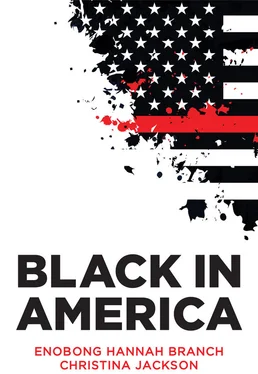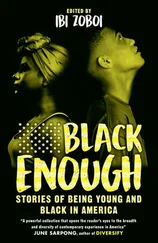201 200
202 201
203 202
204 203
205 204
206 205
207 206
208 207
209 208
210 209
211 210
212 211
213 212
214 213
215 214
216 215
Black in America
The Paradox of the Color Line
Enobong Hannah Branch
Christina Jackson
polity
Copyright © Enobong Hannah Branch and Christina Jackson 2020
The right of Enobong Hannah Branch and Christina Jackson to be identified as Authors of this Work has been asserted in accordance with the UK Copyright, Designs and Patents Act 1988.
First published in 2020 by Polity Press
Polity Press
65 Bridge Street
Cambridge CB2 1UR, UK
Polity Press
101 Station Landing
Suite 300
Medford, MA 02155, USA
All rights reserved. Except for the quotation of short passages for the purpose of criticism and review, no part of this publication may be reproduced, stored in a retrieval system or transmitted, in any form or by any means, electronic, mechanical, photocopying, recording or otherwise, without the prior permission of the publisher.
ISBN-13: 978-1-5095-3141-7
A catalog record for this book is available from the British Library.
Library of Congress Cataloging-in-Publication Data
Names: Branch, Enobong Hannah, 1983- author. | Jackson, Christina Renee, author.
Title: Black in America : the paradox of the color line / Enobong Hannah Branch, Christina Jackson.
Other titles: Paradox of the color line
Description: Cambridge, UK ; Medford, MA : Polity, 2019. | Includes bibliographical references and index. | Summary: “To be Black in America is to exist amongst myriad contradictions: racial progress and regression, abject poverty amidst profound wealth, discriminatory policing yet equal protection under the law. This book explores these contradictions to provide a sociology of Black lives in America today”-- Provided by publisher.
Identifiers: LCCN 2019023981 (print) | LCCN 2019023982 (ebook) | ISBN 9781509531387 (hardback) | ISBN 9781509531394 (paperback) | ISBN 9781509531417 (epub)
Subjects: LCSH: African Americans--Social conditions. | Racism--United States. | United States--Race relations.
Classification: LCC E185.86 .B693 2019 (print) | LCC E185.86 (ebook) | DDC 305.896/073--dc23
LC record available at https://lccn.loc.gov/2019023981LC ebook record available at https://lccn.loc.gov/2019023982
The publisher has used its best endeavors to ensure that the URLs for external websites referred to in this book are correct and active at the time of going to press. However, the publisher has no responsibility for the websites and can make no guarantee that a site will remain live or that the content is or will remain appropriate.
Every effort has been made to trace all copyright holders, but if any have been overlooked the publisher will be pleased to include any necessary credits in any subsequent reprint or edition.
For further information on Polity, visit our website: politybooks.com
Between me and the other world there is ever an unasked question: unasked by some through feelings of delicacy; by others through the difficulty of rightly framing it. All, nevertheless, flutter round it. They approach me in a half-hesitant sort of way, eye me curiously or compassionately, and then, instead of saying directly, How does it feel to be a problem? they say, I know an excellent colored man in my town; or, I fought at Mechanicsville; or, Do not these Southern outrages make your blood boil? At these I smile, or am interested, or reduce the boiling to a simmer, as the occasion may require. To the real question, How does it feel to be a problem? I answer seldom a word.
W. E. B. Du Bois, The Souls of Black Folk
About the Contributors
Authors
Enobong Hannah Branchis a professor of Sociology and Vice Chancellor for Diversity, Inclusion, and Community Engagement, at Rutgers University–New Brunswick. Her research interests are in race, racism, and inequality; intersectional theory; work and occupations; and diversity in science. She is the author of Opportunity Denied: Limiting Black Women to Devalued Work (2011), and the editor of Pathways, Potholes, and the Persistence of Women in Science: Reconsidering the Pipeline (2016), as well as several journal articles and book chapters that explore the historical roots and contemporary underpinnings of inequality.
Christina Jacksonis an assistant professor of Sociology at Stockton University in New Jersey. Her research interests are primarily in the intersections of race, class, and gender; social inequality; urban spaces; social movements; and the politics of redevelopment and gentrification. She is the co-author of Embodied Difference: Divergent Bodies in Public Discourse with Jamie A. Thomas (2019), as well as several journal articles and book chapters.
Contributing authors to chapters
Emmanuel Aderois a senior director in the Office of Equity and Inclusion at the University of Massachusetts–Amherst. He has conducted research on race and inequality, Black masculinity, fatherhood, and the family. He has previously served in numerous research and analytical roles related to demography, public policy, and crime analysis.
Lucius Coulouteis an assistant professor of Sociology at Suffolk University in Boston, MA. His research interests are in race and racism, class, gender, prisoner re-entry, criminalization, insecure work experiences, and organizations. He has also served as a policy analyst with the Prison Policy Initiative and has authored three policy reports related to the re-entry challenges of formerly incarcerated people.
Candace S. Kingis a Ph.D. student in the W. E. B. DuBois Department of Afro-American Studies at the University of Massachusetts–Amherst. She is also an Emmy award-winning journalist (2017) for her coverage of the water crisis affecting predominantly Black communities in Flint, Michigan. Her research interests are in formations of Black female identities and misrepresentations in mainstream media.
Introduction: Are We “Post-racial” Yet?
Post-racial. adjective : having overcome or moved beyond racism: having reached a stage or time at which racial prejudice no longer exists or is no longer a major social problem. 1
America is far from a post-racial society. Racial inequality is in fact our defining social problem. From rates of mass incarceration to infant mortality, health disparities to unemployment, staggering inequality along racial lines is as American as apple pie, so much so that sociologist Andrew Hacker penned a book in 1995 entitled Two Nations: Black and White, Separate, Hostile, and Unequal.
Yet, despite this stubborn reality, many Americans largely desire to live in a post-racial society. In a 2015 survey conducted by MTV, 91 percent of young people between the ages of 18 and 24 said they believed in racial equality. The vast majority of them (68 percent) said focusing on race “prevents society from becoming colorblind.” Persistent inequality, in their view, is caused by focusing on race too much. The problem, as they see it, is America’s preoccupation with race, so if we ignored it, society would be better off. The questions seem to be: What’s up with race? Why can’t we all just get along?
In The Souls of Black Folk , one of the defining works on the Black experience in America, W. E. B. Du Bois opened with conviction and certainty declaring “the problem of the Twentieth Century is the problem of the color line” (1903:7). To our great disappointment, he was right. It is a saddening reality that, well into the twenty-first century, Du Bois’ clarion call still rings true. The problem of the color line remains. While the line itself is increasingly variegated as more racial and ethnic groups call America home, Black Americans retain an unwelcome distinction as America’s problem.
Читать дальше












